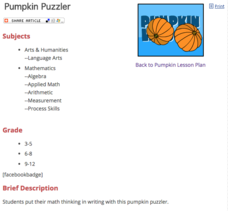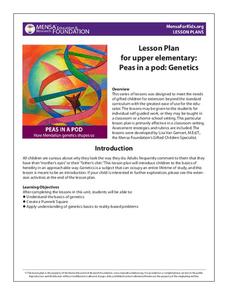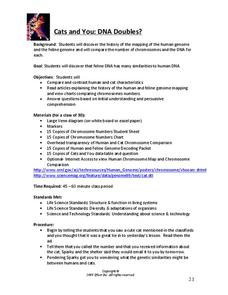Science 4 Inquiry
The Ups and Downs of Populations
As the reality of population decline across many species becomes real, pupils learn about the variables related to changes in populations. They complete a simulation of population changes and graph the results, then discuss limiting...
Melissa Institute for Violence Prevention and Treatment
Concept Muraling
Concept muraling helps learners improve their comprehension of a text by giving them a way to organize their understanding of the key concepts in that text. Introduce readers to this process with a carefully scaffolded lesson that models...
Curated OER
Crazy for Cubes: Art and Science
Learners discuss Sol LeWitt and conceptual art, then analyze the differences in expressing a concept through model-based inquiry and aesthetic art criticism. They develop a geometric, scientific, or mathematical concept, then create an...
Education World
Pumpkin Puzzler
Light the Halloween festivities with an exercise that connects math, physical science, and language arts. After watching a demonstration of a burning candle, learners use division, multiplication, or algebra to determine how many boxes...
Curated OER
Raven Chapter 24 Guided Notes: Evolution of Genomes and Developmental Mechanisms
Explore the evolution of genomes and the human DNA sequence by answering 10 questions on this worksheet. The level of questions included will challenge your advanced biology class to a deeper understanding of genomics.
August House
Go to Sleep, Gecko
Use this multidisciplinary lesson to delve into these subjects: English language arts, math, science, drama, and character education. After reading, discussing, and making interpretations about Go To Sleep, Gecko!: A Balinese...
Cornell Cooperative Extension
Rope Making
Jump ropes, dock lines, cables. The science and technology behind rope making is the focus of a seven-page packet that ends with a rope making challenge.
MENSA Education & Research Foundation
Peas in a Pod: Genetics
Can peas have grandparents? Learn about inherited traits and heredity with a set of activities focused on Mendelian genetics. As your class learns about the process of passing traits along in Punnett squares, they take on the role of...
Beyond Benign
Cats and You: DNA Doubles?
What do cats and human DNA have in common? The second lesson of a series focuses on the mapping of mammal genomes. Scholars learn about the structure of DNA as they compare the chromosomes of humans and felines.
Beyond Benign
What is Biotechnology
Examine the sequence of key events in the history of genetics. An engaging lesson plan asks scholars to sort events to create a timeline of biotechnology milestones. Arranging the events gives learners a perspective on the...
Illustrative Mathematics
Tilt of Earth's Axis and the Four Seasons
Geometry meets earth science as high schoolers investigate the cause and features of the four seasons. The effects of Earth's axis tilt features prominently, along with both the rotation of the earth about the axis and its orbit...
PBS
Scale City — Inverse Proportions and Shadows in the Real World
Bring the resource out from the shadows. Viewers of a short video learn about drive-in theaters and how operators project images onto a large screen. They then perform an experiment to determine the relationship between the distance of...
California Department of Education
Instruments of Change: Making a Simple Stringed Instrument (CTE)
What materials and skills does a person need to build a simple working instrument? With the first of four lessons from the Changing One's Tune: A Music Therapy STEM Integrated Project series, scholars learn about the basic structure of...
Howard Hughes Medical Institute
Cancer Discovery Activities
Explore the genetic component of the second-leading cause of death in the world using a hands-on activity. After watching a video discussing the basics of cancer, learners complete activities that study the genes involved in cancer. The...
Radford University
Pollution and Curves of Best Fit
Don't put the resource on curves of best fit out on the curb. Using researched data on trash and recycling, scholars create scatter plots and regression curves to analyze the information. As a culminating activity, they complete projects...
Curated OER
Introduction to Computing and Project Development
Students use a computer and math to complete a science project. They review a brief history of computers as well as information on different operating formats will be included. In addition, students complete an overview of the hardware...
Other popular searches
- 4th Grade Science Project
- Physical Science Projects
- Science Project on Pulleys
- Science Project Volcano
- Science Project Gravity
- Science Project Ideas
- Forensic Science Project
- Science Fair Project Ideas
- Rock Science Project
- Science Project Food
- Science Project Terrarium
- Science Fair Project Data















